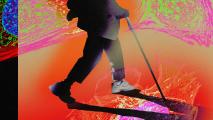
Biotech
Human history has been all but defined by death and disease, plague and pandemic. Advancements in 20th century medicine changed all of that. Now advancements in 21st century medicine promise to go even further. Could we bring about an end to disease? Reverse aging? Give hearing to the deaf and sight to the blind? The answer may be yes. And soon.
More
Study discovers how one sleep stage reactivates memories
New research suggests that during NREM sleep, our brain is more likely to store positive memories.
An ancient technique can improve your attention span
According to neuroscientist Amishi Jha, 12 minutes of mindfulness training a day strengthens your attentional systems.
Potential heart attack treatment discovered in human placentas
Placental cells known to home in on and repair damaged heart cells in mice have been discovered in humans, too.
To stave off Alzheimer’s, protect your brain’s mitochondria
Mitochondria are crucial for memory preservation and are emerging as key players in the fight against Alzheimer’s.
World-first experiment shows genetically engineered bacteria detecting cancer
Genetically engineered bacteria could be used to detect a range of different diseases, particularly infections and cancers.
Weight-loss drug improves heart failure symptoms, too
Novo Nordisk’s popular weight-loss drug semaglutide (Wegovy) improved heart failure symptoms in a trial of more than 500 people.
Arrays of quantum rods could enhance TVs or virtual reality devices
MIT engineers have used DNA origami scaffolds to create structured arrays of quantum rods, which could be incorporated into LEDs.
Paralyzed woman able to speak again, thanks to brain-avatar interface
Speech BCIs that use brain implants and algorithms to translate brain signals into text are changing the lives of people with paralysis.
Scientists bioengineer plants to have an animal-like immune system
Scientists have bioengineered a hybrid molecule by fusing components from an animal’s and a plant’s adaptive immune system.
New obesity treatments could reshape the world
New obesity treatments, including GLP-1 agonists and gene therapies, could make it easier for people to lose weight and keep it off.
“5 stages of grief” is a myth — and knowing that helps us better cope with loss
The “monomyth” model of grieving offers closure and recovery, but in most traditional cultures the dead never leave the living.
Life’s stages are changing – we need new terms and new ideas to describe them
The arc of adult development has changed over the past several decades, in ways that our psychological theories are still catching up with.
One-shot gene therapy for liver disorder works in a small trial
A new gene therapy for the rare liver disorder Crigler-Najjar syndrome was highly effective in a small trial.
A Pink Floyd song was reconstructed from listeners’ brain waves
Training an AI to reconstruct a song from listeners’ brain activity revealed insights about the brain that could lead to better speech BCIs.
Breakthrough creates stem cells without any “memories”
A new method for creating induced pluripotent stem (iPS) cells includes a memory reset that puts the cells in a more embryonic-like state.
“Light sculpting” chip can rapidly test for thousands of diseases
Stanford researchers have developed a new type of molecular test that works without a cumbersome amplification step.
Scientists discover a gel that whitens teeth and kills 94% of bacteria
Scientists have found that light-activated oxidizing nanoparticles can whiten teeth without causing damage.
A pig kidney is still working in a person after 32 days
A gene-edited pig kidney has been functioning in a person for a record-breaking 32 days and still shows no signs of failure.
Can you manipulate your brain to stop your food cravings?
Research suggests it may be possible to “switch off” the pleasure we experience from eating certain foods, which could curb cravings.
Brain scans reveal the mystery of “hidden consciousness”
Newly identified patterns of injury linked to “hidden consciousness” could lead to better outcomes for people in comas or vegetative states.
Subscribe to the newsletter































